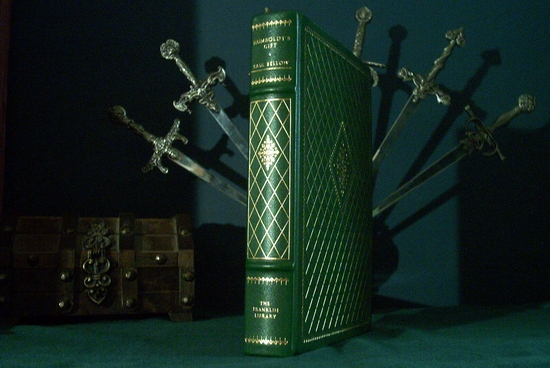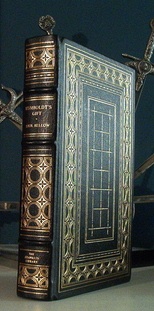Franklin Library Saul Bellow books
Humboldt's Gift - 100 Greatest Masterpieces of American Literature - 1980
The Dean's December - Limited First Edition Society - 1982
Humboldt's Gift - Pulitzer Prize Classics - 1983
Who is Saul Bellow?
Born on June 10, 1915, in Lachine, Quebec, Canada, Solomon Bellows, later known as Saul Bellow, emerged as one of the preeminent American novelists of the 20th century. His illustrious career, marked by intellectual depth, linguistic prowess, and a profound exploration of the human condition, earned him numerous accolades, including the Nobel Prize in Literature. Bellow's family moved to Chicago when he was a child, and the city's vibrant and diverse atmosphere would become a significant influence on his writing. After earning a Bachelor's degree from Northwestern University, Bellow pursued graduate studies at the University of Wisconsin and later at the University of Chicago, where he completed a Master's degree in Anthropology and Sociology.
World War II interrupted Bellow's academic pursuits, leading him to serve in the Merchant Marine and the U.S. Army. Following the war, he resumed his studies and began his literary career. His first novel, Dangling Man (1944), reflected the existential uncertainties of the post-war period and showcased the thematic richness that would characterize his future works. Bellow's breakthrough came with The Adventures of Augie March (1953), a sprawling and ambitious novel that won the National Book Award. This marked the beginning of a series of literary triumphs. His exploration of identity, self-discovery, and the complexities of human relationships resonated with readers and critics alike.
In 1964, Bellow achieved further acclaim with Herzog, a novel that earned him the National Book Award and solidified his reputation as a master of American literature. Bellow's prose, characterized by its intellectual vigor and linguistic dexterity, delved into the psychological and philosophical dimensions of his characters' lives. The pinnacle of Bellow's literary career came with the Nobel Prize in Literature in 1976, recognizing his "human understanding and subtle analysis of contemporary culture." His acceptance speech, titled The Writer and His Culture, reflected his deep reflections on the role of literature in understanding and shaping the human experience.
Bellow's later novels, including Humboldt's Gift (1975) and The Dean's December (1982), continued to garner critical acclaim. Humboldt's Gift earned him a second National Book Award and a Pulitzer Prize, showcasing Bellow's enduring relevance and ability to adapt his exploration of modern life to contemporary concerns. Saul Bellow's literary legacy is not confined to novels; he also produced essays, short stories, and plays that further demonstrated his intellectual versatility. His writing engaged with a range of themes, including the immigrant experience, the search for identity, and the challenges of modernity. Saul Bellow passed away on April 5, 2005, in Brookline, Massachusetts, leaving behind a literary legacy that continues to inspire and challenge readers. His exploration of the complexities of the human psyche, coupled with his linguistic brilliance, secures his place as a towering figure in American literature whose impact transcends generations.
Humboldt's Gift
The novel, for which Bellow won the Pulitzer Prize for Fiction in 1976, is a self-described "comic book about death," whose title character is modeled on the self-destructive lyric poet Delmore Schwartz. Charlie Citrine, an intellectual, middle-aged author of award-winning biographies and plays, contemplates two significant figures and philosophies in his life: Von Humboldt Fleisher, a dead poet who had been his mentor, and Rinaldo Cantabile, a very-much-alive minor mafioso who has been the bane of Humboldt's existence. Humboldt had taught Charlie that art is powerful and that one should be true to one's own creative spirit. Rinaldo, Charlie's self-appointed financial adviser, has always urged Charlie to use his art to turn a profit. At the novel's end, Charlie has managed to set his own course.
The Dean's December
Albert Corde, dean of a Chicago college, is unprepared for the violent response to his expose of city corruption. Accused of betraying his city, as well as being a racist, he journeys to Bucharest, where his mother-in-law lies dying, only to find corruption rife in the Communist capital. Switching back and forth between the two cities, The Dean's December represents Bellow's "most spirited resistance to the forces of our time" - Malcolm Bradbury.
Saul Bellow quotes
"You never have to change anything you got up in the middle of the night to write."
"A great deal of intelligence can be invested in ignorance when the need for illusion is deep."
"People can lose their lives in libraries. They ought to be warned."
"Everybody needs his memories. They keep the wolf of insignificance from the door."
"Art has something to do with the achievement of stillness in the midst of chaos."


Comments
Post a Comment
Share your best book review and recommendation